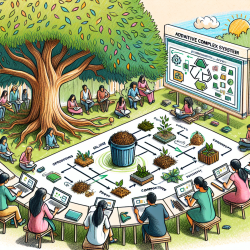The global shift towards sustainability has prompted educators to explore innovative pedagogies that integrate nature's complexity and coherence into learning experiences. The research article "Sustainability Pedagogy: Understanding, Exploring and Internalizing Nature’s Complexity and Coherence" by Nicole Spiegelaar offers valuable insights for practitioners seeking to enhance their skills through sustainability-focused education.
The Core of Sustainability Pedagogy
Sustainability pedagogy emphasizes the importance of understanding nature as an adaptive complex system. This approach encourages learners to engage with the environment in a way that fosters cognitive and affective restoration, resilience, and pro-environmental values. By integrating these principles into educational practices, practitioners can support students in developing a deeper connection to nature and a greater sense of agency in addressing environmental challenges.
Purpose-Directed Attention
A key component of this pedagogy is purpose-directed attention, which involves focusing on specific aspects of nature to promote meaningful engagement and discovery. This approach contrasts with passive observation, encouraging learners to actively explore their surroundings and develop a nuanced understanding of ecological interactions. Practitioners can implement this technique by designing activities that prompt students to observe patterns, relationships, and changes in their natural environment over time.
Adaptive Complex Systems
The concept of adaptive complex systems is central to sustainability pedagogy. It highlights the interconnectedness of ecological, social, and economic systems and the dynamic processes that drive change within them. By adopting this framework, practitioners can help students develop systems thinking skills that are essential for addressing complex sustainability challenges. This involves teaching students to recognize the interdependence of various components within a system and to appreciate the non-linear dynamics that characterize natural processes.
The Benefits of Nature Immersion
Nature immersion is a powerful tool for enhancing psychological well-being and fostering a sense of connection to the environment. Research has shown that spending time in natural settings can reduce stress, improve mood, and enhance cognitive functioning. For practitioners, incorporating nature-based activities into their programs can provide students with opportunities for experiential learning and personal growth.
- Cognitive Restoration: Nature immersion supports cognitive restoration by allowing individuals to recover from mental fatigue. This is achieved through exposure to environments that offer a balance of security and stimulation.
- Affective Benefits: Engaging with nature can lead to improved emotional well-being by providing opportunities for reflection, relaxation, and connection with others.
- Sustainability Mindsets: By fostering a sense of connectedness to nature, practitioners can cultivate pro-environmental values and behaviors in their students.
Implementing Sustainability Pedagogy in Practice
Practitioners interested in integrating sustainability pedagogy into their work can start by designing curricula that emphasize experiential learning and systems thinking. This may involve incorporating field activities, reflective journaling, and collaborative projects that encourage students to explore the complexities of natural systems.
The integration of these pedagogical strategies can empower students with the knowledge and skills needed to navigate the complexities of sustainability challenges. By fostering a deeper connection to nature and promoting adaptive thinking, practitioners can play a crucial role in shaping future leaders who are equipped to address environmental issues with creativity and resilience.
Encouraging Further Research
The findings from Spiegelaar's research highlight the potential benefits of sustainability pedagogy for both educators and learners. However, there is still much to explore regarding its implementation across different educational contexts. Practitioners are encouraged to conduct further research on how these principles can be adapted to various disciplines and student populations.
This ongoing inquiry will contribute to a growing body of knowledge on effective sustainability education practices, ultimately supporting the development of more resilient and environmentally conscious individuals.










